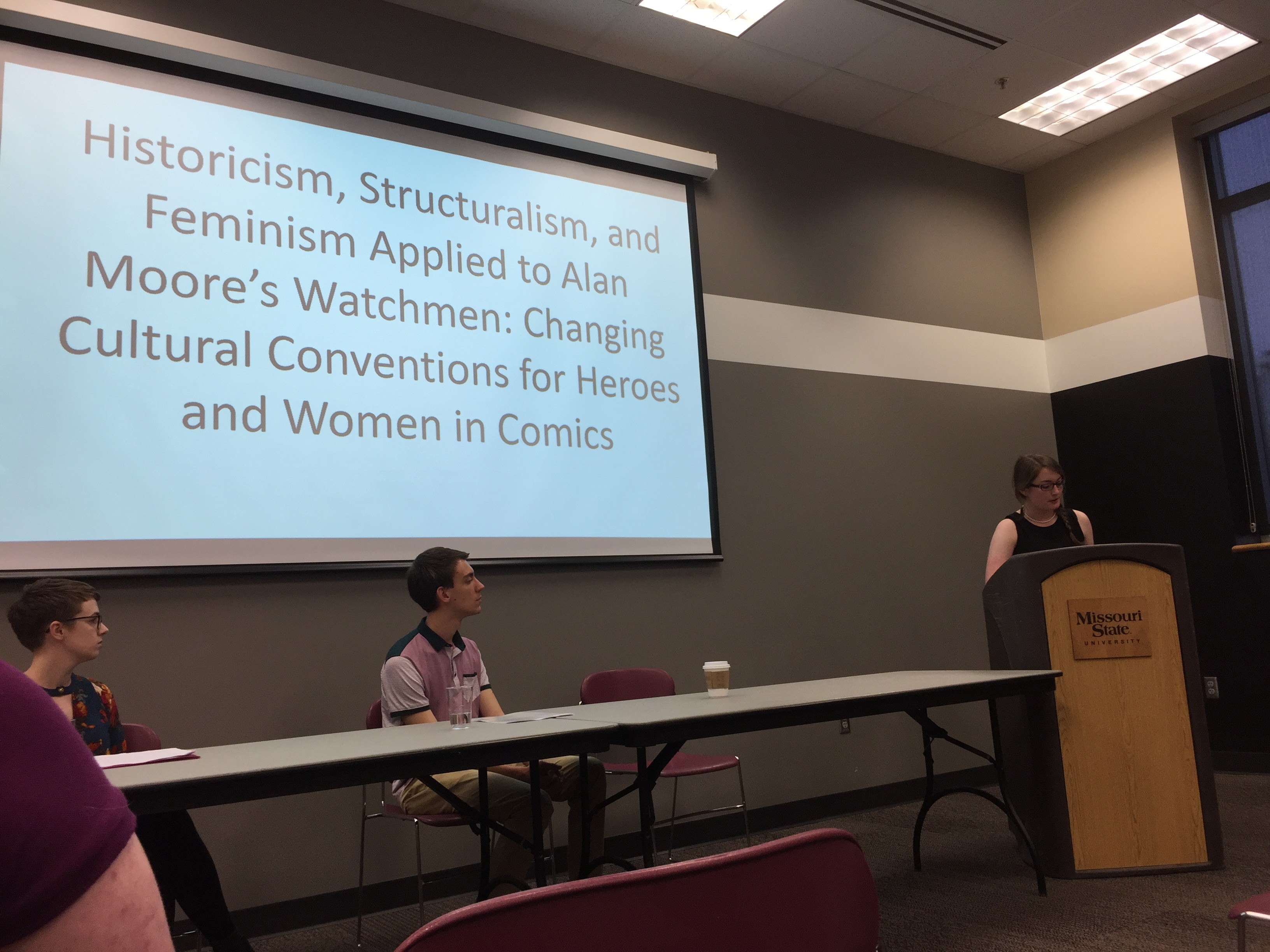By Taylor Shaw-Hamp and K. Shartel Hall
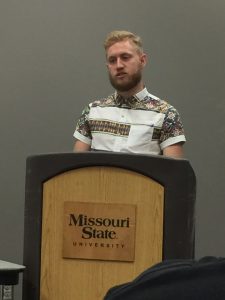
Missouri State University presented the 3rd Annual Undergraduate Literature Conference this past Friday and Saturday. Missouri State students from a variety of programs presented in-depth research on a multitude of texts, such as Christina Orlandos’ inspection of the roles of women in the public and private spheres in stage plays (“Women as Detectives and Jurors in Susan Glaspell’s Trifles”) to TJ Pyatt’s analysis of poetry (“Stevie Smith: Poetry Transcending Sex and Power”) to Amanda Hadlock’s study of the shifting dynamics of women in DC comics (“Historicism, Structuralism, and Feminism Applied to Alan Moore’s Watchmen: Changing Cultural Conventions for Heroes and Women in Comics”). The texts varied from classic to modern and there was a little bit of everything in between. Audiences listened to these incredible papers while enjoying light refreshments of tea, coffee, and pastries courtesy of the department.
To participate in the conference, students submitted abstracts which were reviewed by the Conference committee comprised of faculty members and graduate students. After selection, the students worked with graduate students on the conference committee to tailor their presentations to a conference format. The Undergraduate Literature Conference was the first conference style presentation for several students, though it did boast some returning faces from previous years. The students who presented range across the discipline, and a number of the students who presented have indicated their desire to continue with similar studies in the future, some at the graduate level.
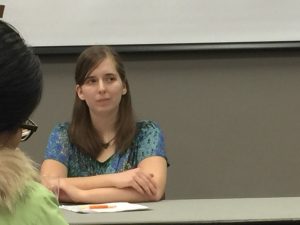
The opening day of the Undergraduate Literature Conference was Friday, April 21 at the Plaster Student Union. The first round of panelists for the session titled “Women in Literature” read their papers to an audience of standing-room only. Christina Orlandos, Calvin Coon (“‘Lion Strength’ and Christian Femininity in The Chronicles of Narnia”), and Elizabeth King (“Pearl of Beauty: An Analysis of Pearl’s Role in Nathaniel Hawthorne’s The Scarlet Letter”) all participated in this session and fielded questions from peers and professors alike following their papers.
For the second round, TJ Pyatt, Michelle Trantham (“The Spark of Life: Lack of Moral Sympathy in Frankenstein”), and Zachary Rea (“Out of Touch: A Shift in Human Intimacy in Alexander Weinstein’s Children of the New World”) presented thought provoking papers about words, knowledge, and the role of technology in our lives in the session titled “The Risks of Human Relationships.”
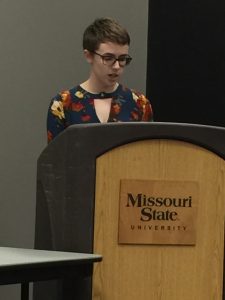
The third panel was titled “Challenges to Gender Convention” in which Dailynn Turner (“A Miserable Spectacle of Wrecked Humanity: Frankenstein’s Homosexual Anxieties”) presented a new way to interpret Mary Shelly’s great classic. Seth Hadley (“Gabriel Conroy in James Joyce’s ‘The Dead’: A Representation of Patriarchal Society’s Response to Feminism”) pointed out other ways than just Marxist criticism to read Joyce, and Amanda Hadlock had everyone’s attention as she displayed comic strips on the projector screen during her literary criticism of graphic novels.
The first day of panel sessions ended with “Interrogating Race,” with presenters Katie Jones (“Dehumanization through Ploy: Langston Hughes’s The Ways of White Folks”), Allison Minicky (“An Insincere, Pacifying God: How Richard Wright’s Religious Experience Paved a Path to Communism”), and Aundrea Davis (“The Furrow of Her Brow: Revolutionary Construction of Black Female Community in Toni Morrison’s Paradise”) bringing the sessions to a close, but not before engaging in a lively discussion with the audience on the questions raised by their papers.
This year’s keynote speaker for the Undergraduate Literature Conference was Missouri State’s own Dr. Jonathan Newman. Following the last panel session, Dr. Newman explained how medieval poetry served as a social medium in his presentation “Literary Confession and Social Exchange in the Middle Ages: The Case of Thomas Hoccleve.” He introduced the audience to this lesser studied peer of Geoffrey Chaucer, and discussed some on his ongoing research on the subject which he is working to expand into a book length study.
The Undergraduate Literature Conference resumed Saturday morning to a large crowd with Maggie Morris (“The Roles of Public Performance and Personal Agency in Ophelia’s Suicide”), Noah Standish (“Stigmas and Masculinity in James Baldwin’s Giovanni’s Room”), and Tianna Snyder (“AIDS Representation in Clive Barker’s Sacrament”) as panelists in the session “Gender and Sexuality.”
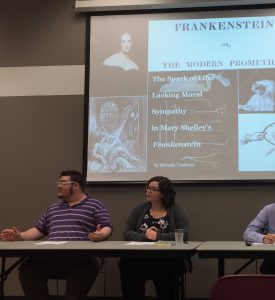
The next hour followed perfectly with the panel “Sexuality in Popular Culture” featuring Genevieve Richards (“Girlish Obsessions: Victorian Society and Contemporary American Culture”), Megan Rogers (“Art as the Riot Grrrl’s Weapon in The Awakening”), and Kimberly McMurray (“Denial of Bisexuality: Bi-Erasure in Orange is the New Black”). In the question period, Genevieve expanded on her points, having condensed her paper from a larger seminar project, Megan handed out materials to the audience that would have prominence in the Riot Grrrl movement, and Kimberly discussed how modern media is moving away from a norm of bi-erasure.
Jupiter Kieschnick (“The Fearful Sublime: Browning’s Use of Tone to Create Awe through Terror”) and Ryan Davies (“Adjusting to the Dark: An Exploration of Love’s Multiplicity in Gone Home”) switched things up with their panel “Experimental Narratives.” Both students spoke passionately on these unique narratives, exploring darker and more complex narrative styles. For the second year in a row, the conference has featured compelling papers on topics unconventional in the field, bringing to light their relevancy in our field.
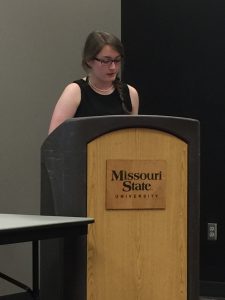
Bringing the 3rd Annual Undergraduate Literature Conference to a close were the panelists Scott Rossi (“Medic! A Brief Ethnography of Street Medics”), Ashley Blankenship (“Teaching Ethnicity in the Ozarks: Michael Gold’s Jews Without Money”), and Gabrielle Riegel (“Abortion Activism in Cider House Rules”) with their session “Literacy and Cultural Activism.” Scott spoke from his own personal experience as a street medic, explaining the need for more critical research on the topic, while Ashley brought a compelling argument regarding current pedagogy in High Schools. Gabrielle, our last presenter of the conference spoke compellingly on a difficult conflict present in the novel she examined.
Overall, this third Undergraduate Literature Conference was a wonderful success with fascinating, beautiful, and thoughtful scholarship from Missouri State students. The audiences had incredible follow up questions, prompting the panelists to speak more on their research and inklings. Congratulations to this year’s panelists and thank you for sharing your amazing research! We’re already looking forward to next year’s sessions!

